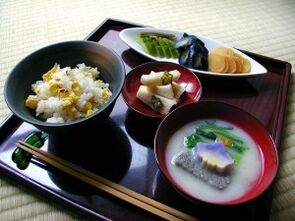The Japanese Diet was created at one of the diet clinics in this country.
The authors of this system claim that it completely reconfigures the human body's metabolism, after which the lost extra pounds will not return for at least a few years.
Basic principles of the Japanese diet

A prerequisite for the adoption of the Japanese diet is the complete refusal of all alcohol, the prohibition of the use of salt and sugar, flour products and confectionery.
A certain diet plan, designed for two weeks, must be strictly adhered to: all these days it is necessary to follow the set menu on a regular basis.
The authors of the diet suggested that deviations from the diet could unnecessarily shift metabolism. One of the conditions of the Japanese diet is to drink one and a half liters of filtered water per day.
Here is an example of the first day following the suggested Japanese diet plan:
- breakfast - coffee;
- lunch - a couple of eggs with one tomato or 200 g of tomato juice, fresh cabbage salad;
- dinner - fish, 200 g and cabbage salad.
It can be seen right from this example that the diet is not typical Japanese food at all. In Japan, carbohydrates are favored, mainly in the form of grains, they also eat a lot of seafood, vegetables and fruits. According to many doctors, it is this way of eating that has helped the Japanese have a longer life.
In the Japanese diet, the 14-day menu pays very little attention to carbohydrates, which are the main source of energy, which means that the body, when looking for new ways to get food, will begin to consume those foods. available protein reserves. in muscle tissue.
As a result, not fat tissue is lost, but muscle tissue. The situation does not change even increase the amount of protein, which causes the kidneys to overload.
Menu for all 14 days
First:
- Breakfast - coffee, a cup.
- Lunch - two eggs, cabbage salad with avocado, tomato juice.
- Dinner - fish with olive oil.
Second:
- Breakfast - coffee and brown bread.
- Lunch - fish 200 g.
- Dinner - 100g of boiled beef with a glass of yogurt.
Tuesday:
- Breakfast - coffee with crackers.
- Lunch - zucchini, fried in oil.
- Dinner - two hard-boiled eggs, cabbage salad, 150 g of boiled beef.
Wednesday:
- Breakfast is coffee.
- Lunch - a hard-boiled egg, 3-4 pieces of boiled carrots, olive oil, a piece of hard cheese.
- Dinner - a moderate amount of fruit, except bananas with grapes.

Thursday:
- Breakfast - grated carrots, lemonade.
- Lunch - 200 grams of fish, tomato juice.
- Dinner - fruit, except bananas with grapes.
Friday:
- Breakfast is coffee.
- Lunch - 200 grams of boiled chicken and cabbage salad with oil.
- Dinner - a couple of hard-boiled eggs, raw carrot salad with avocado.
Saturday:
- Breakfast - green tea.
- Lunch - 200g beef, some fruit, except banana with grapes.
- Dinner - any dinner option this week, except Tuesday.
Eighth:
- Breakfast is coffee.
- Lunch - boiled chicken - 250 g, oiled cabbage salad.
- Dinner - two hard-boiled eggs, carrot salad (200 g), olive oil.

Ninth:
- Breakfast - raw grated carrots, lemon juice.
- Lunch - fish, tomato juice.
- Dinner - various fruits (except bananas with grapes).
Tenth:
- Breakfast is coffee.
- Lunch - hard-boiled eggs and 3-4 boiled carrots, olive oil, slices of hard cheese.
- Dinner - variety of fruit except banana with grapes.
Eleventh:
- Breakfast - coffee with crackers.
- Lunch - sliced zucchini, fried in oil.
- Dinner - two eggs, cabbage salad with butter, 200 g of boiled beef.
Twelveth:
- Breakfast - coffee and crackers.
- Lunch - 200 grams of fish, vegetable salad, cabbage with butter.
- Dinner - drink 100 grams of beef with a glass of kefir.
Thirteenth:
- Breakfast is coffee.
- Lunch - two eggs, oiled cabbage salad, tomato juice.
- Dinner - 200 g of fish,
Day fourteen, the day before:
- Same menu as the 13th.
Nutritionist's review
In the proposed diet, there is an obvious lack of leading trace elements - calcium, magnesium, potassium, which the body needs to function properly.
There is also a lack of iron, without which the blood-forming organs cannot function. Vitamins A, B, C are also lacking, if not provided enough in the body, it will make the appearance deteriorate, the efficiency will decrease, the work of the endocrine glands and digestive organs is disturbed.
The Japanese 14-day diet is low in calories and monotonous which can lead to relapses and overeating. After the first week of adopting such a diet, sleep disturbances and decreased performance may be observed.
Black coffee in the Japanese diet is a controversial product. Japanese cuisine does not use coffee at all. People with cardiovascular disease should be wary of drinking coffee.






























